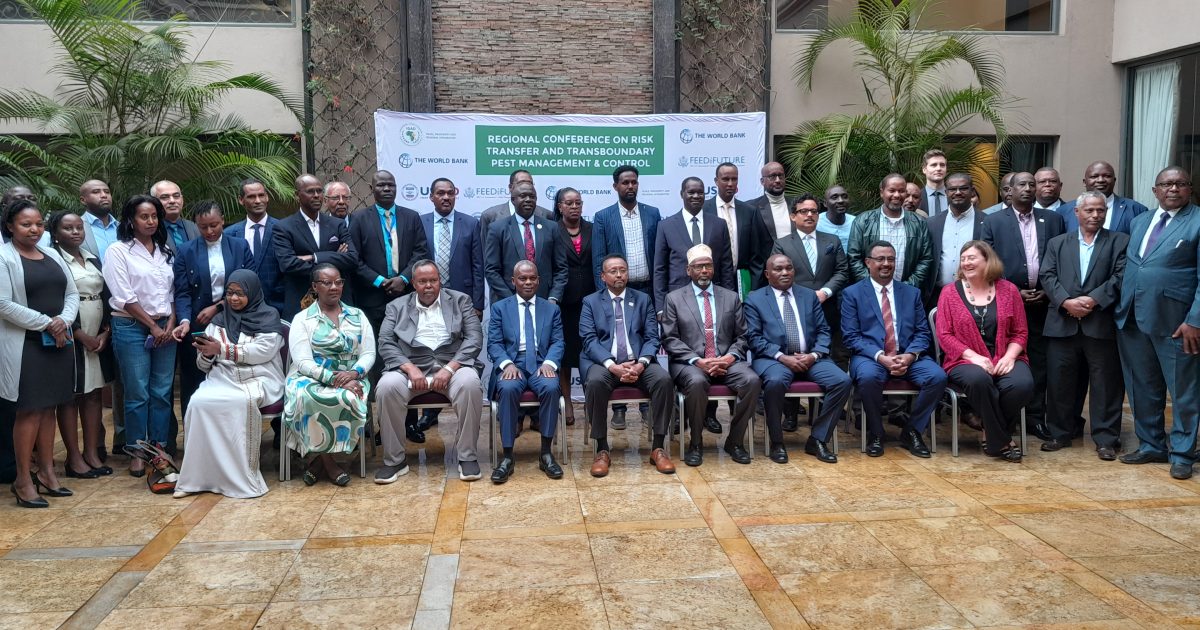The Ministers, Heads of Delegations and representatives of Intergovernmental Authority on Development (IGAD) member states have embarked on the path to discuss and share collective understanding of the region’s state of risk transfer mechanisms and transboundary pest management and affirm shared commitment to promote proactive risk management.
Ministry of Agriculture, Livestock and Fisheries Cabinet Secretary (CS), Mithika Linturi, lauded the initiative by IGAD through its climate prediction and application centre (ICPAC) and the support provided by the United States of America in the role of risk transfer and microinsurance mechanisms in building the resilience of societies against various risks.
In a speech read on his behalf by the Agriculture Principal Secretary at the State Department for Crop Development in the Ministry of Agriculture and Livestock, Josephat Muhunyu, the CS said, “There are many risks like climate-related disasters and disease outbreaks that transcend national boundaries and there is a need to explore opportunities for cross-border collaboration in order to effectively address shared challenges.”
Linturi expressed his concerns over the region’s increased vulnerability to climate change and observed intensification of extreme climate events, including droughts and floods and their impact on food security and livelihoods.
He further recognised the crucial role of technology and data to enhance efficiency of risk transfer and microinsurance corporations, which will recognise the need for awareness campaigns and educational programmes to promote the benefits of risk transfer and microinsurance organisms.
“I urge Member states through the IGAD secretariat to be proactive in sharing information and best practises to coordinate and build the necessary capacities in combating the locust menace to predict, monitor and control the spread of new swarms,” Linturi said.
In addition, the CS declared joint commitment to develop a comprehensive road map that prioritises the strengthening of the region’s food systems and enhancing resilience to the multi-dimensional risks that impact food security across the region to promote their wellbeing and sustainable development, which will lead to peace.
“I commit to working with Desert Locust Control Organisation of Eastern Africa (DLCO_EA) and Food and Agricultural Organisations (FAO) to collaborate and synergize their activities in combating desert locust and other transboundary pests and provide technical support to member state to enhance early warning systems,” he noted.
The IGAD Executive Secretary, Dr Workneh Gebeyeh, said that the recent assessments by the Intergovernmental Panel on Climate Change (IPCC) show that climate change is a threat to all future development efforts in Africa due to high vulnerability of local communities and their low capacity to address the impacts of climate variability and change.
“Food insecurities caused by extreme weather events, transboundary pest infestations, violent conflict and microeconomic challenges in the IGAD region have reached unprecedented and alarming level,” he said.
Gebeyeh emphasised the need to come together as a unified force to address vulnerability more effectively, promote sustainable development and build resilience among pastoralists and subsistence farmers.
“The integration of risk transfer and microinsurance services into community-based approaches is vital for promoting social cohesion and mutual support, which will improve access to education and health care for the vulnerable population within our region,” he added.
He noted that to maximise the impact, they should address challenges such as limited awareness, financial literacy and regulatory barriers through United efforts so as to ensure implementation and long-term success.
Gebeyeh emphasised that implanting integrated pest management (IPM) practises across the region will reduce reliance on chemical pesticides and promote sustainable pest control since pest control regulations will facilitate smooth movement of Agricultural commodities, thus increasing trade opportunities and ultimately enhancing food security.
By Nice Wambui and District Masinde




